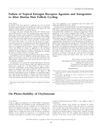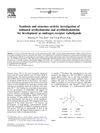 10 citations,
October 2014 in “Journal of Ovarian Research”
10 citations,
October 2014 in “Journal of Ovarian Research” The IRS-2 Asp/Asp genotype may increase the risk of PCOS in Chinese women, especially if they are not obese.
[object Object]  10 citations,
November 2010 in “Journal of Dermatology”
10 citations,
November 2010 in “Journal of Dermatology” Longer CAG repeats in gene linked to more severe hair loss in females.
 9 citations,
July 2021 in “Essays in Biochemistry”
9 citations,
July 2021 in “Essays in Biochemistry” Sex hormones may influence COVID-19 severity, with males at higher risk, and certain hormone therapies could potentially treat the virus.
 9 citations,
June 2021 in “International Journal of Pharmaceutics”
9 citations,
June 2021 in “International Journal of Pharmaceutics” Using polymeric micelles to deliver spironolactone topically could improve wound healing in skin affected by glucocorticoids.
 9 citations,
April 2021 in “Expert opinion on pharmacotherapy”
9 citations,
April 2021 in “Expert opinion on pharmacotherapy” Clascoterone is a new, effective, and safe acne treatment without systemic side effects.
 9 citations,
March 2020 in “Gene”
9 citations,
March 2020 in “Gene” Certain gene variants in estrogen receptors are linked to polycystic ovary syndrome, mainly affecting metabolism, in Tunisian women.
9 citations,
February 2020 in “Journal of Cosmetic Dermatology” Pulsatilla chinensis compounds may help prevent stress-related hair loss.
 9 citations,
January 2016 in “Skin Pharmacology and Physiology”
9 citations,
January 2016 in “Skin Pharmacology and Physiology” The study concluded that both estrogen and androgen receptors, which decrease with age, are linked to skin aging and may be hormonally regulated.
 9 citations,
September 2015 in “Reproductive Biomedicine Online”
9 citations,
September 2015 in “Reproductive Biomedicine Online” Longer GGN repeats in the androgen receptor gene are linked to polycystic ovary syndrome.
 9 citations,
September 2014 in “Cancer Epidemiology, Biomarkers & Prevention”
9 citations,
September 2014 in “Cancer Epidemiology, Biomarkers & Prevention” Certain genetic variants in the androgen receptor are linked to higher PSA levels, potentially affecting prostate cancer screening outcomes.
 9 citations,
March 2009 in “Psychoneuroendocrinology”
9 citations,
March 2009 in “Psychoneuroendocrinology” Certain gene variations are linked to better memory in healthy Chinese women.
 9 citations,
January 2005 in “Experimental dermatology”
9 citations,
January 2005 in “Experimental dermatology” Melatonin receptors in hair follicles help regulate hair growth and could treat hair loss.
9 citations,
September 2002 in “The Journal of clinical investigation/The journal of clinical investigation” Blocking testosterone speeds up wound healing in males.
 8 citations,
March 2020 in “Frontiers in Cell and Developmental Biology”
8 citations,
March 2020 in “Frontiers in Cell and Developmental Biology” Researchers created immortal human skin cells with constant testosterone receptor activity to study hair loss and test treatments.
 8 citations,
May 2019 in “Journal of dermatological treatment”
8 citations,
May 2019 in “Journal of dermatological treatment” Vismodegib is effective for basal cell carcinoma but has severe side effects.
8 citations,
October 2016 in “Journal of Investigative Dermatology” MR antagonists may improve skin health and wound healing, especially in aging.
 8 citations,
January 1998 in “Journal of Investigative Dermatology”
8 citations,
January 1998 in “Journal of Investigative Dermatology” Topical estrogen treatments did not change hair growth in certain mouse strains, questioning previous findings on their role in hair growth control.
 7 citations,
January 2019 in “Postepy Dermatologii I Alergologii”
7 citations,
January 2019 in “Postepy Dermatologii I Alergologii” Certain gene variations might be linked to severe acne in women but not in men.
7 citations,
October 2015 in “Experimental dermatology” Blocking the mineralocorticoid receptor can help treat skin thinning caused by steroids.
 7 citations,
July 2014 in “Reproductive Biomedicine Online”
7 citations,
July 2014 in “Reproductive Biomedicine Online” The length of CAG repeats in the androgen receptor gene is linked to ovarian reserve but does not affect how the ovaries respond to stimulation.
 7 citations,
April 2009 in “Bioorganic & Medicinal Chemistry Letters”
7 citations,
April 2009 in “Bioorganic & Medicinal Chemistry Letters” Diphenyl ethers can potentially reduce excess oil production when applied on the skin, helping treat conditions like acne.
7 citations,
January 1989 in “Archives of Dermatological Research” The side gland of Suncus murinus is a good model for studying human sebaceous glands.
 6 citations,
September 2023 in “Experimental physiology”
6 citations,
September 2023 in “Experimental physiology” A special receptor in sensory nerve endings helps control how they respond to stretching.
6 citations,
November 2022 in “Antioxidants” OR2AT4 helps reduce aging and cell damage in human skin cells.
 6 citations,
January 2022 in “Journal of Investigative Dermatology”
6 citations,
January 2022 in “Journal of Investigative Dermatology” Male pattern baldness is linked to higher levels of a certain receptor in the scalp, which leads to the shrinking of blood vessels and hair loss. Early treatment targeting this receptor could be more effective.
6 citations,
December 2021 in “International Journal of Endocrinology” The genetic variant studied does not affect PCOS symptoms in Kashmiri women.
[object Object]  6 citations,
January 2020 in “International journal of biological sciences”
6 citations,
January 2020 in “International journal of biological sciences” Removing the ROBO4 gene in mice reduces skin inflammation and hair loss by affecting certain inflammation pathways and gene expression.
 6 citations,
January 2013 in “Genetics and Molecular Research”
6 citations,
January 2013 in “Genetics and Molecular Research” Women with hair loss have more androgen receptors in certain hair follicles.
 6 citations,
January 2010 in “Neoplasma”
6 citations,
January 2010 in “Neoplasma” Certain gene patterns in breast cancer are linked to how active hormone receptors are and could affect patient survival.
 6 citations,
November 2004 in “Bioorganic & Medicinal Chemistry Letters”
6 citations,
November 2004 in “Bioorganic & Medicinal Chemistry Letters” Scientists created iodinated arylhydantoins and arylthiohydantoins that could potentially be used for imaging prostate cancer. Some versions with specific side-chains showed high potential for this use.






















